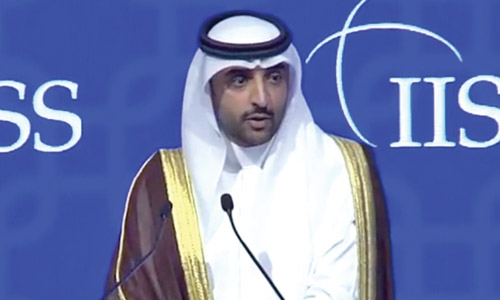World is yet to find a suitable alternative for oil: Bahrain Minister
Manama : Electric cars are not a true replacement for gasoline vehicles, the Minister of Oil said, while debunking the myths about how alternative energy could take up significant market share from the gasoline industry.
The world is yet to find a replacement for oil, Minister of Oil Shaikh Mohammed bin Khalifa Al Khalifa, said yesterday while speaking at the IISS Geo-Economics Conference: Bahrain Bay Forum entitled “MENA economies: positioning for a new world (dis) order”. Around 200 business leaders, government officials, and economic analysts from the all over the world gathered at Four Seasons Hotel Bahrain Bay to discuss the drivers of the energy markets.
“Are electric cars really going to replace gasoline vehicles? or is just wishful thinking?” he quizzed the delegates present at the forum.
“We in the hydrocarbon business, try to promote the concept of clean energy as opposed to green energy because green is sometimes thought of as anti-hydrocarbon. We believe that hydrocarbon is and will always be an important part of the energy mix and unfortunately there is no true replacement for it and we think that the facts actually support that. Plus, with the political developments of late such as the US shifting away from the Paris accord, this is an interesting time to figure out which direction we are heading,” he said.
“Lets go back to this notion of peak demand, people really believe the notion that the electric cars are going to replace the gasoline cars in the not so distant future. If you look at Tesla today, each tesla would consume 60 kilograms of lithium. Lithium’s production in the world is around 3500 tons. If you would use all the lithium produced today, the maximum you can produce are half a million electric vehicles. The scale is just not there, unfortunately, it would be nice to move in that direction but the facts don’t support it. There is a huge global economy that needs to be fueled and there is no alternative that has the scalability,” he said.
“A study by the Swedish environmental institute shows that the production cycle of a lithium battery for a tesla car or any other electric vehicle emits more carbon than eight years of gasoline engine emissions. So, is electric vehicles free of carbon emissions? And the facts are showing that you are just replacing one kind of pollution with another. The culprit we see are the emissions and not the hydrocarbons themselves. Hydrocarbons have been the most efficient carrier of energy the world has ever found, oil in particular,” he said.
“The world has always worked best by allowing the markets to decide what’s best for the future generations, whenever policy comes in too quickly the effects generally are negative. Europe started with renewables a bit early. One of the challenges for the future is not to decide too quickly in policies and allow the markets and technologies to do what they usually do. The horse and carriage industry did not disappear because someone decided to ban it in the past. It disappeared because the technology was ripe enough and the car came in and took over. We have to allow technology and the markets to decide what the future should hold for us and that is what oil companies would ultimately promote. If we look at the current focus, its on emissions, we are looking at reducing co2 emissions,” he said, adding, “We believe that hydrocarbons will continue to be the dominant fuel and we don’t think there is a true replacement,” he said.
Adding insight about the dip in oil prices in 2015 he said, “2015 saw the very sharp decline of the oil price that created an unexpected challenge and put a lot of volatility to the future. If we go back to the financial crisis in 2008 there was a lot of quantitative easing by US and a lot of dollars were injected into the US and global economy. A big part of that went into fueling the shale revolution, it was cheap credit and technology that was an inflationary stimulus and it created an unexpected oversupply in the most important commodity in the world. Four million barrels came out unexpectedly and this is why we had an oversupply,” he said.
Related Posts

